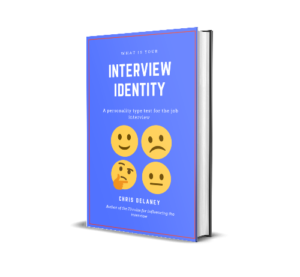Why are job interviews so tricky?
One of the main reasons why most career professionals struggle in a job interview is because no-one is taught how to act during a recruitment process.
Everyone knows that during a structured job interview the employer will ask a set of industry related questions to check the competencies level of all applicants.
Each answer is then scored on the interview scorecard.
What is an interview scorecard?
An interview scorecard is the document each interviewer has to help them rank the applicants interview answers against the essential criteria for the position being hired.
The interview scorecard, in chronological order, lists all the job interview questions. Beneath each question is a list of the skills, qualities and experiences required for the advertised role, and/or an example answer/pointer for the allocated points.
In the main employer use scoring of 1-4; 1 = weak, 2 = medium, 3 competent, 4 = expert – with each employer having their own scorings system.
A fair interview is created through this analytical process, especially when conducted by a panel interview allowing each interview score(s) to be normed, decreasing the effect of job interview unconscious bias.
An interviewee, to be successful, not only has to gain a higher score than the competition but also needs to achieve enough points to beat the benchmark to be viewed as suitable for the role.
Why is it hard to pass a job interview?
Being a highly skilled and experienced professional should result in a higher than average job interview to job offer ratio.
For many career professionals, their interview identity – how an employer perceives the applicant based on a level of knowledge/experience vs level of confidence formula, results in a less skilled applicant being offered the position they are best suited for.
Even when a candidate’s wealth of sector knowledge is clear on the application form, the lack of self-promotion concludes with an employer’s negative assessment.
To be successful in a job interview requires the interviewer to view the applicant as highly skilled, an expert or someone they cant do without.
So, whats the problem?
The problem that many interviewees face is they simply can’t structure their interview answers (content and delivery) in a way that inspires the interviewer.
This problem has an easy to implement solution: 3 easy to implement ideas that will make your next interviewer want to hire you.
Confident Statement

The first few seconds of a job interview answer are deemed to be very important.
As many career professionals are aware, an initial impression is created by the employer when they first meet the interviewee – hireable or undesirable. This impression affects how the employer views the applicant’s whole job interview.
If a visual impression can have such a huge effect at the interview start, then the opening words of an interview answer can shape how the employers score the question being marker.
- Unsure
- Hesitant
- Confident
Being unsure of what is being asked or blatantly having no idea what a (sector jargon) is, highlights a lack of industry knowledge.
An employer, now aware that the applicant lacks sector experience, is unlikely to hire that candidate. During the Q&A process, they will long for the interview to end, and look forward to the next, hopefully, more suitable interviewee.
Asking for an explanation of a sector terminology, theory, model or working practice creates the interview identity of ‘inexpert’.
Successful interviewees answer questions with a confident statement:
- I am highly skilled in this area
- This is something I have had to do in all my previous roles
- My current managers always come to me with this problem
A confident statement is an opening line, delivered instantly, that simply highlights 1) a level of understanding of the job duties 2) a confident employee 3) sector experience
Employers are reassured when applicants start their answers by confidently confirming they have the required skill being discussed. As a secondary gain, employers are now likely to listen to the whole interview answer, picking up on more of the scoring criteria – scoring high on the interveiw scorecard.
Evidence Equals Expert

A picture is worth a thousand words.
In the main, employers make hiring decisions based on the content of an applicants interview answer. The detail given could possibly be exaggerated, misinterpreted or an out right lie.
Evidence, in the form of a target sheet, references, data sets, media articles or a physical item, is proof of an interviewees expertise.
By using evidence as part of the interview answer backs up any claims of competencies. It also highlights how the applicant is prepared, organised and detailed focus.
Different industry use the ‘evidence’ technique to get a customer to buy. Sweet shops will often hand out free samples; once the quality of the chocolate has been tasted, the customers is now more likely to purchase the product. It is the same in the job interview, the sample evidence is given as proof of ability before the employer buys into the candidate.
To be perceived as being highly skilled, bring evidence to the job interview. Or for virtual job interviews use the share screen function to show online proof of the candidate’s abilities.
Future Focus

Low scoring job applicants when asked a competency based job interview question will often just list skills and duties, other, more high scoring interviewees, gain points by telling stories relating to their past behaviors in the workplace.
But only a few utilise the future projection method.
Employers use the recruitment process to predict the candidates job performance.
What employers really want to know is – what can you do for me?
To end a job interview answer, the successful applicant will take the skill being discussed and explain how they would use their abilities in the employers workplace.
“…once I am employed in your organisation I will use (skill) to (outcome)”
A future focused interview answer allows the employer to visualise how the employee would fit within the company culture and what added value that applicant would bring to the overall team.
The structure of an interview answer.
Using the team work interview question as an example, an applicant using the CEF structure could answer the question by:
Confident statement; “In all my previous roles I have always worked with a team. where I have a reputation of achieving project objectives on time..”
Evidence; “…An example of this was when I worked on X project. During this project, my team was tasked with completing X. The barrier here was (state a problem you had to overcome). As a team we (state solution to the problem) I personally was responsible for (explain actions and steps you took) which resulted in (add positive outcome). The team was able to achieve this outcome because of (add reason IE being well organised used gannt charts and work packages) I actually have a copy of the project plan and gannt charts with me (show evidence)..”
Future focus; “…if I was offered a role working in your company, it would be my organisational and detailed approach that would allow to us collaborate successfully together to achieve project deadlines while ensuring the quality of the project.”

CEF Structure
The CEF structure is highly successful as the employer, through the initial statement, feels confident in the applicants attitude, as only industry experts or highly experienced professionals, would answer so confidently.
Stating you have a skill/experience isn’t enough, and even strong answers can be an exaggeration, so the producing of evidence, literally, shows the employer why you were initially so comfortable in the answering of the interview question.
And by making the answer relevant to the employers company, not only shows a deep understanding of the position being advertised, it can create a positive association between the vision and the applicant.












